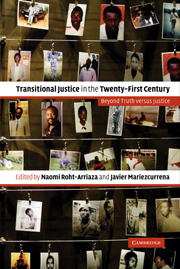Book contents
- Frontmatter
- Contents
- List of contributors
- Acknowledgments
- The new landscape of transitional justice
- Part I Truth, justice, and multiple institutions
- Part II Levels of justice: Local, national and international
- Introduction to Part II
- 7 A new approach to restorative justice – East Timor's Community Reconciliation Processes
- 8 Justice at the grassroots? Gacaca trials in Rwanda
- 9 Bremer's “Gordian Knot”: Transitional justice and the US occupation of Iraq
- 10 Truth, justice and stability in Afghanistan
- 11 The prosecution of Hissène Habré: International accountability, national impunity
- 12 Argentina's contribution to global trends in transitional justice
- 13 Transitional justice: Lessons learned and the road ahead
- Index
Introduction to Part II
Published online by Cambridge University Press: 05 June 2012
- Frontmatter
- Contents
- List of contributors
- Acknowledgments
- The new landscape of transitional justice
- Part I Truth, justice, and multiple institutions
- Part II Levels of justice: Local, national and international
- Introduction to Part II
- 7 A new approach to restorative justice – East Timor's Community Reconciliation Processes
- 8 Justice at the grassroots? Gacaca trials in Rwanda
- 9 Bremer's “Gordian Knot”: Transitional justice and the US occupation of Iraq
- 10 Truth, justice and stability in Afghanistan
- 11 The prosecution of Hissène Habré: International accountability, national impunity
- 12 Argentina's contribution to global trends in transitional justice
- 13 Transitional justice: Lessons learned and the road ahead
- Index
Summary
The chapters in this Part focus on the interplay among different spheres or levels on which transitional justice efforts can occur, and the particular challenges and advantages of working at each of these levels. Of course, the question of whether justice should be sought at the local, national or international level is not an either/or question: multiple levels are needed. For example, it is difficult to imagine the gacaca process in Rwanda described in Chapter 8 having any legitimacy were it not for simultaneous efforts at the international (ICTR) and national levels to deal with the most serious offenders. But in these cases there is either a new emphasis on local-level efforts, a new conditionality imposed by outside intervention, or a new reopening from outside that intersects with domestic processes.
Chapters 7 and 8 exemplify the local-level approach, in which decentralized fact-finding, justice and, to some extent, reparation, is meted out by local villagers to others who committed crimes (the “little fish”) through informal processes based in part on customary law.
Patrick Burgess, principal legal counsel to the East Timor Commission for Reception, Truth and Reconciliation, talks about that Commission's innovative Community Reconciliation Procedures (CRPs). These village-level hearings for low-level offenders exchanged public disclosure, apology and sometimes minimal reparations for legal amnesty and social reintegration into their communities. Burgess finds that the CRPs were a resounding success despite problems with integration into the formal justice system and concerns about potential victim coercion and the inability to get at the major masterminds of the crimes.
Information
- Type
- Chapter
- Information
- Transitional Justice in the Twenty-First CenturyBeyond Truth versus Justice, pp. 173 - 175Publisher: Cambridge University PressPrint publication year: 2006
Accessibility standard: Unknown
Why this information is here
This section outlines the accessibility features of this content - including support for screen readers, full keyboard navigation and high-contrast display options. This may not be relevant for you.Accessibility Information
- 1
- Cited by
